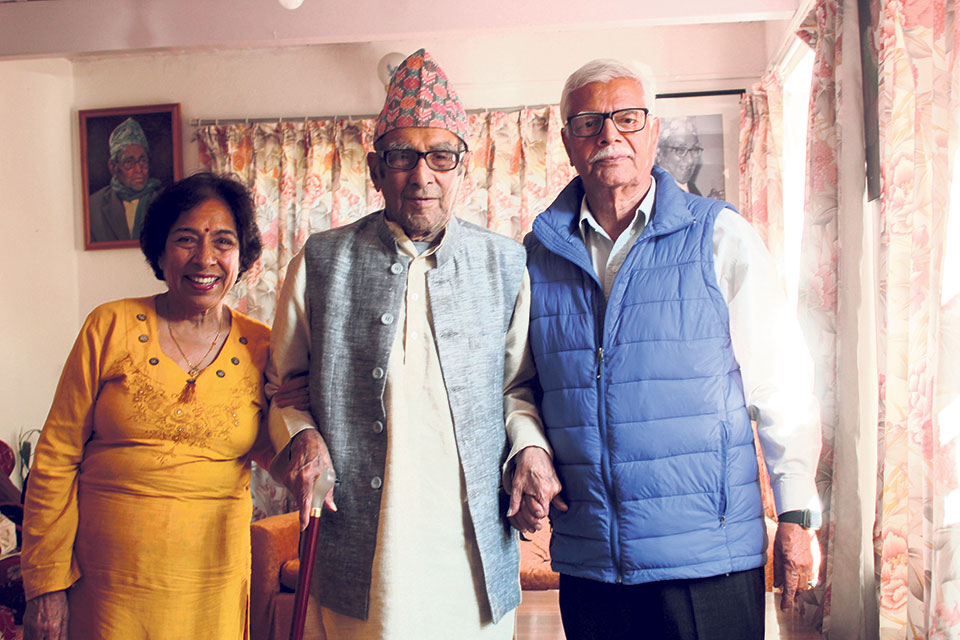
KATHMANDU, Oct 18: The resounding Dashain song has already echoed our homely walls as we enter the sixth day of the festival. Dashain much known for a family reunion and longer days off from work is an occasion to rejoice with an age-old culture and rituals sharing roots to our deep-seated values and beliefs. Over the decades, our new trends and practices have quite blended in adding different ways of celebration. However, no matter how much we long to play the Dashain swing or how many kites we flew in the past years, the spirit of celebration has remained intact with nurturing our religious significance of truth's victory over the evil.
The early reflections of Dashain could no more be well depicted by the centenarian Rastrakavi Madhav Prasad Ghimire. In his 100th year of long and good health, he sketched pictures of his childhood Dashain reminisces when he was dwelling in Pustun village of Lamjung. As Rastrakavi remembers Dashain, his happiness is still as energetic as it was when he was young. His happiness is proven when he sings:
“Dashain aayo
Khaulapiula
Kahapaula?
Chori lyaula,
Dhat papi chhuttai basaula.”
Means of having fun
Rashtra Kavi Madhav Prasad Ghimire remembers enjoying Dashain at Pustun, Lamjung. As the means of having fun were limited in his teenage days, he says the only thing that made his day rich was the ‘Ping’. He wouldn’t realize time go by while swinging at the ping.
“During my teenage days, I would wait for Dashain so that I could touch the sky while swinging on the ‘Ping’. I would play the entire day and feel the air passing behind my ears. We used to be excited about the swing even before the festival. What’s the meaning of being lazy when ‘Bada Dashain’ comes just once a year?” he expressed while remembering the memories of his Pustun village.
Apart from the swing, Rashtra Kavi said that he would also go from one house to another to have fun. He explained, “The locals of Pustun used to conduct ‘Naach Gaan’. As I was always ahead in having fun, I would go from one house to another singing and dancing.”
The golden year
Dashain, in the past, had vigor and excitement attached to it. The festival is often associated with revamping the wardrobe, enjoying hearty feasts, gathering to play the swing and expecting a huge sum of Dakshina.
"Like any ordinary child, I used to relate the festival as a mere occasion and indicator to acquiring new clothes and having special meat items to eat once a year," remembers Rastrakavi, Madhav Prasad Ghimire.
"The other thing that fascinated us about Dashain was that we got to earn money by collecting Dakshina. The idea of receiving Tika and Dakshina is now practiced only within the family, but we used to roam from one house to another, within the neighborhood, and carry it as a chore during Tika. Even five paisa was a big deal then. Beaten rice was presented as Dakshina. We would store it in our Patuki, around our waists," added Ghimire.
Calling off a family quarrel
According to the poet, family disputes would settle during Tika in Pustun. Most quarrels only lasted less than a year. The people who had fought with their relatives would go and accept Tika and settle their disputes.
He also shared, “As my mother passed away when I was two, I don’t remember spending Dashain with her. However, I have held on to a memory with my father (Gauri Shankar Ghimire) and my Thulba. My Thulba showed no respect to anyone, including my father. He had once said something very nasty to my father. My father, in anger, replied he would never step foot in Thulba’s place. He seemed very determined. Even on Tika, my father wasn’t willing to go to Thulba’s house. After I insisted, he agreed. My father took yogurt as a gift along. When my Thulba saw my father coming, he cried. I will never forget that moment.”
Shanti Adhikari, Madhav Prasad Ghimire's daughter, said that she only remembered a true moment with her father and also her grandfather. As the poet of the nation shared a moment which he would never forget, the daughter of the poet said that her grandfather was kind to everyone. “He was down to Earth. Even though my granddad’s brother was rude most of the time, both of my grandfathers loved my father,” she added while Ghimire stated the story.
Dashain blues
Over the course of time, many changes have occurred on how people opt to celebrate the festival. Contemplating the changes in the few decades, Ghimire expressed that the disheartening fact today was that people had numerous mediums of entertainment but their happiness and contentment seem to be compromised and limited. "The idea of drinking and gambling was quite new. Neither were there such video games or fun parks like we have today. Despite that, the fun time was full of energy and rejuvenation," he added.
Daughter expresses joys to be receiving blessing from a centenarian
Growing up with Rastrakavi Ghimire has always been an honor, says Shanti Adhikari. Adhikari stated, “Baba used to take break from all his work to spend some quality time with the family during Dashain. From Fulpati to Tika, he wouldn’t write anything. All our siblings dwell nearby; he would ensure we had meat in our houses during Astami. He would also check if our home had colorful lights.”
Adhikari is looking forward to accepting Tika and blessings the centenarian. She questioned, “Isn’t it a privilege for the nation to have a 100-year-old poet celebrating the biggest festival of the country?”


Leave A Comment